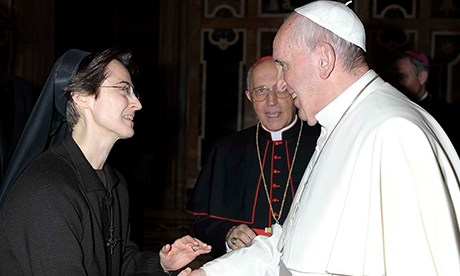Pope Francis has overhauled the Vatican’s central bureaucracy, dramatically expanding the number of top leadership roles lay Catholics, both men and women, can hold.
On Saturday, Francis issued a new constitution for the Vatican’s central administration, known as the Curia, stating that any baptised lay Catholics can head Vatican offices.
For centuries, male clerics have headed the departments, usually cardinals or bishops, but that could change from June 5, when the new charter takes effect after more than nine years of work.
The new constitution said the role of lay Catholics in governing positions in the Curia was “essential” because of their familiarity with family life and “social reality”.
The 54-page constitution, called Praedicate Evangelium (Preach the Gospel), was released on the ninth anniversary of Francis’ installation as pope in 2013. It replaces one issued in 1988 by Pope John Paul II.
The preamble says, “The pope, bishops and other ordained ministers are not the only evangelisers in the Church”. It adds that lay men and women “should have roles of government and responsibility”.
Another section says, “any member of the faithful can head a dicastery (Curia department)” if the pope decides they are qualified and appoints them.
It makes no distinction between lay men and lay women. However, experts said at least two departments – the department for bishops and the department for clergy – will remain headed by men because only men can be priests in the Catholic Church.
The text says choices will be made based on people’s professional competence, spiritual life, pastoral experience, sobriety and love for the poor, a sense of community and “ability to recognise the signs of the times.”
Francis has already named several lay people, including women, to Vatican departments.
In 2021, Francis appointed Sister Raffaella Petrini (pictured) as the Secretary General of the Governorate of Vatican City State. It was the first time a woman had been named to the number two position in the world’s smallest state.
As part of the reorganisation, the Secretariat of State kept its premier position as administrative, coordinating and diplomatic department, while the centuries-old high status of the doctrinal office was placed below that of the evangelisation department.
The pope will head the evangelisation office himself, highlighting the importance he gives to spreading and reviving the faith.
The new office is responsible for the church’s evangelical efforts worldwide, including supporting new churches. It is divided into two sections: one responsible for fundamental questions surrounding evangelisation and the other tasked with overseeing places of “first evangelisation”.
Sources
Additional readingNews category: Palmerston, World.




